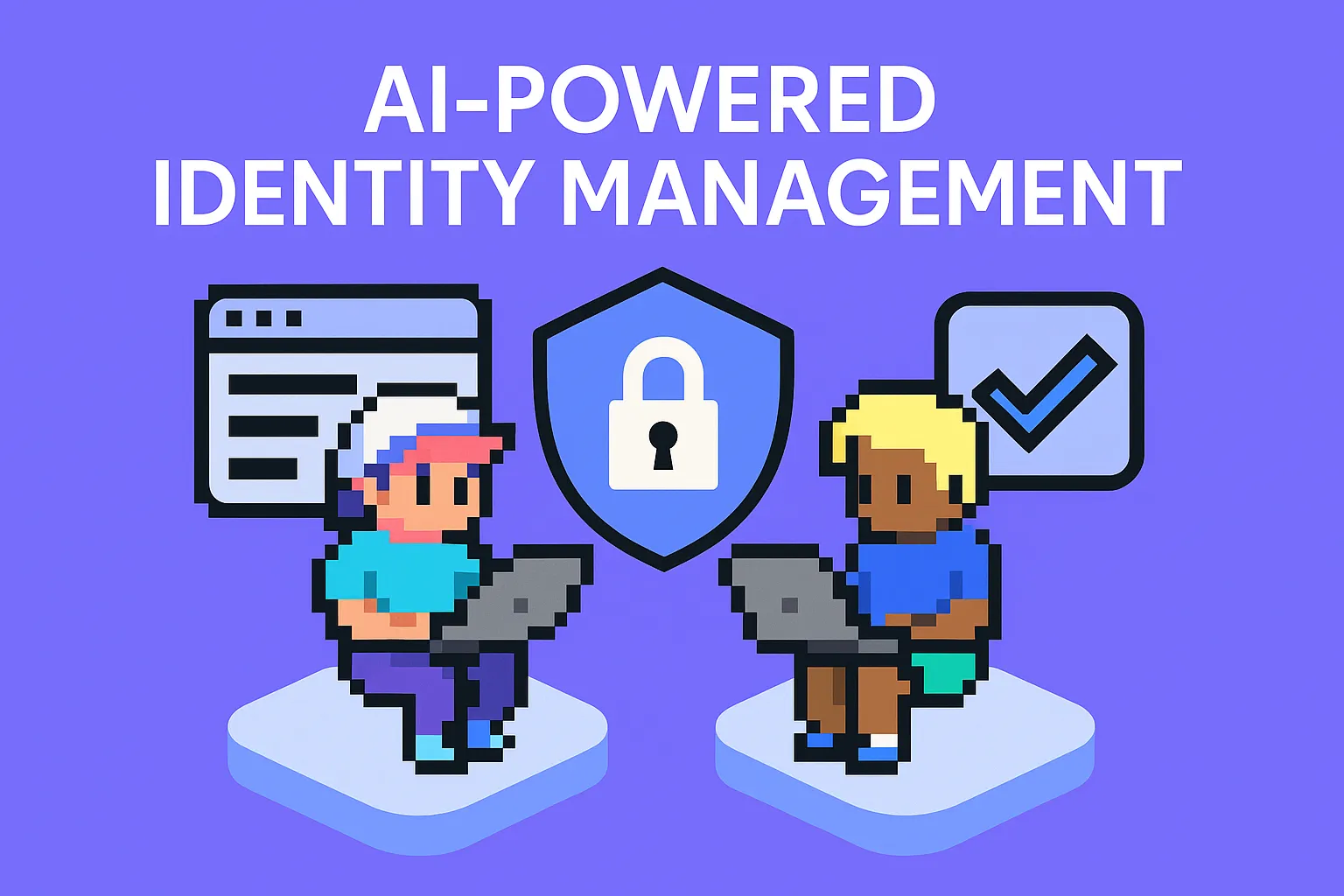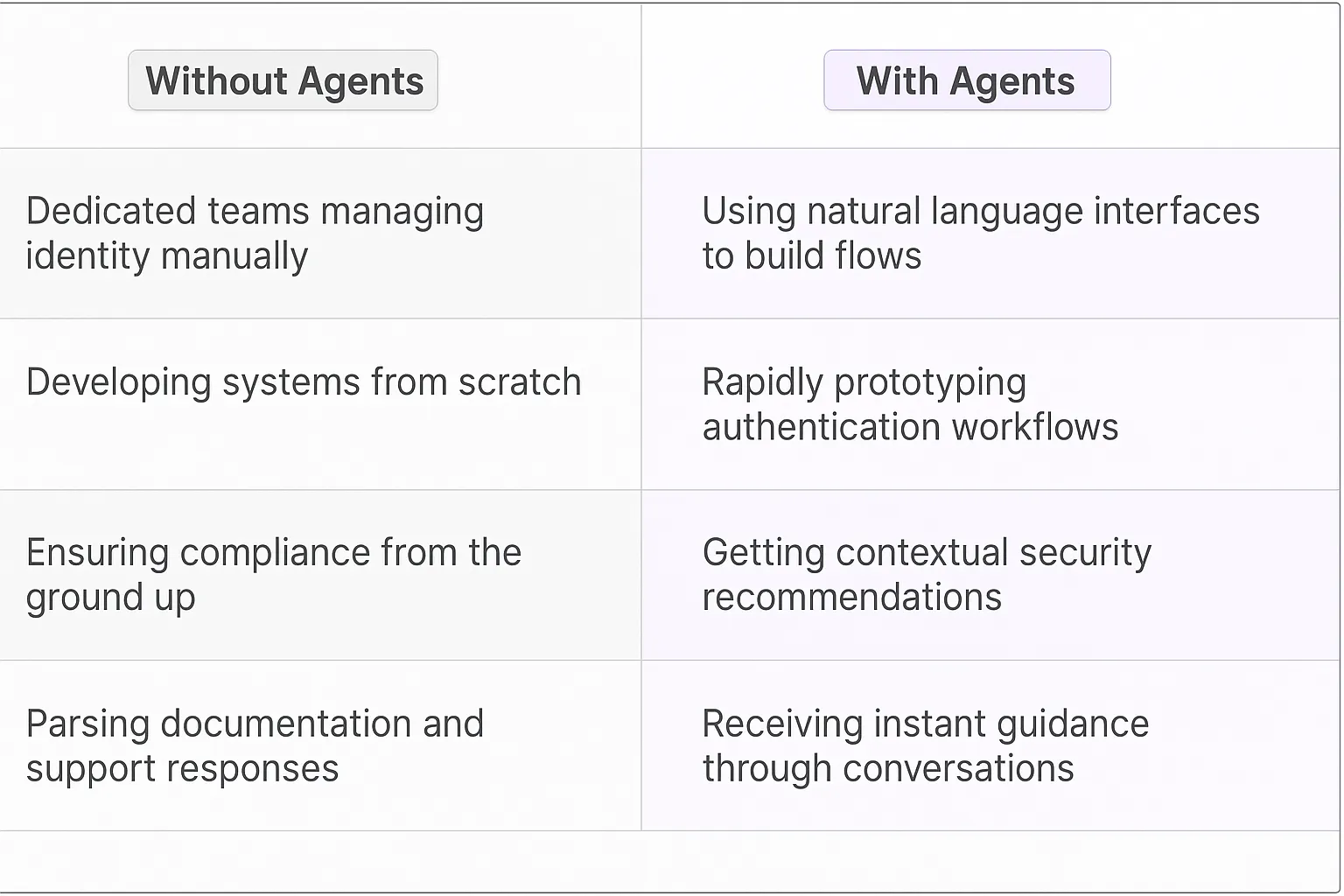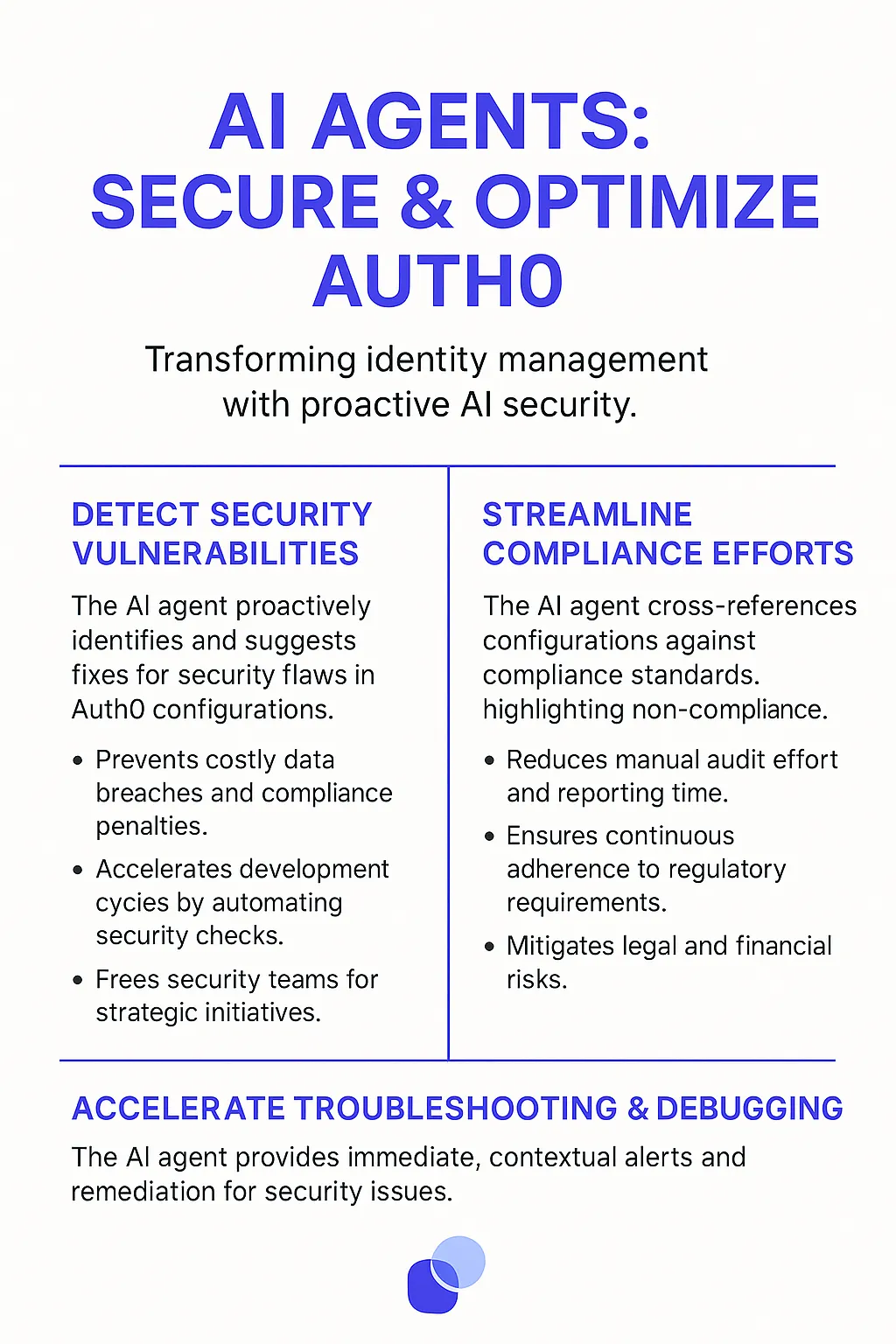Auth0
Understanding Auth0's Identity Management Platform
What is Auth0?
Auth0 is an advanced identity management platform that handles authentication and authorization for applications. The platform provides enterprise-grade identity services including single sign-on, multi-factor authentication, and social login integration. At its core, Auth0 solves the complex challenges of modern identity management by providing a secure, scalable infrastructure that adapts to diverse authentication needs.
Key Features of Auth0
The platform excels in several critical areas:- Universal authentication support across web, mobile, and legacy applications- Customizable login flows and branding options- Advanced security features including anomaly detection- Extensive integration capabilities with existing systems- Enterprise-grade scalability and compliance- Detailed analytics and user behavior tracking- Role-based access control and granular permissions

Benefits of AI Agents for Auth0
What would have been used before AI Agents?
Authentication and identity management traditionally required dedicated engineering teams spending countless hours writing custom code, managing security protocols, and handling user authentication flows manually. Development teams faced the complex task of building and maintaining identity systems from scratch while ensuring compliance with evolving security standards.
Teams relied on extensive documentation, support tickets, and direct communication with Auth0 support staff to troubleshoot issues and implement new features. This created bottlenecks in development cycles and slower time-to-market for critical authentication functionality.
What are the benefits of AI Agents?
AI Agents transform how developers interact with Auth0's identity platform through natural language interfaces that decode complex authentication workflows. Rather than parsing through documentation or waiting for support responses, developers can rapidly prototype and implement authentication flows through conversational interactions.
The agents provide contextual guidance by analyzing existing Auth0 configurations and suggesting optimizations based on security best practices and usage patterns. They can spot potential vulnerabilities in real-time and recommend specific fixes, essentially acting as an always-on security advisor.
For debugging and troubleshooting, AI Agents analyze logs and error messages to pinpoint root causes and suggest solutions. They can generate sample code snippets tailored to specific use cases and tech stacks, accelerating implementation time from hours to minutes.
The network effects are particularly powerful - as more developers interact with Auth0's AI Agents, the system learns from successful patterns and edge cases across thousands of implementations. This creates a continuously improving knowledge base that benefits the entire Auth0 developer community.
Most critically, AI Agents help democratize access to robust authentication by making advanced identity features accessible to developers of all skill levels. Complex workflows like multi-factor authentication, social login integration, and JWT token management become approachable through natural language guidance.

Potential Use Cases of AI Agents with Auth0
Identity Management Automation
AI Agents can transform how teams handle identity management in Auth0. By monitoring user authentication patterns, these digital teammates detect anomalies and potential security threats before they escalate. They analyze login attempts, flag suspicious activities, and automatically adjust security parameters based on risk levels.
User Access Control
Managing role-based access becomes more intelligent with AI Agents integrated into Auth0. The agents learn from historical access patterns to suggest appropriate permission levels for new users, reducing administrative overhead and strengthening security protocols. They can proactively identify over-privileged accounts and recommend user access control adjustments.
Authentication Flow Optimization
AI Agents analyze user authentication journeys and identify friction points in the login process. They suggest optimizations to reduce drop-offs while maintaining security standards. The agents can dynamically adjust multi-factor authentication requirements based on user behavior and risk profiles.
Security Rule Management
Auth0's rule system becomes more dynamic with AI Agents. These digital teammates continuously evaluate rule effectiveness, suggest refinements, and help create new rules based on emerging security threats. They can automatically update rules to address zero-day vulnerabilities and evolving attack patterns.
Compliance Monitoring
AI Agents monitor authentication logs and user activities to ensure compliance with security standards and regulations. They generate detailed reports highlighting potential compliance issues and recommend remediation steps. The agents track regulatory changes and suggest updates to authentication policies to maintain compliance.
User Experience Enhancement
By analyzing authentication success rates and user feedback, AI Agents help optimize the login experience. They identify common authentication failures and suggest improvements to reduce user frustration. The agents can also personalize authentication flows based on user preferences and behavior patterns.
Integration Management
AI Agents streamline the process of managing Auth0's various integrations. They monitor integration health, detect configuration issues, and suggest optimization opportunities. The agents can automate the testing of new integrations and validate compatibility with existing systems.
These use cases demonstrate how AI Agents can enhance Auth0's capabilities while reducing manual overhead and improving security posture. The combination of artificial intelligence and identity management creates a more robust and efficient authentication system.

Industry Use Cases
Auth0's identity management platform becomes exponentially more powerful when paired with AI agents. These digital teammates transform how organizations handle authentication and user management across multiple sectors. The real magic happens when AI agents take on the complex, repetitive tasks that traditionally bog down engineering and security teams.
While every organization's identity needs differ, certain patterns emerge across industries where AI agents create the most impact. From financial institutions managing millions of secure logins to healthcare providers protecting sensitive patient data, the applications are both practical and transformative. Let's dive into specific examples that demonstrate how AI agents enhance Auth0's capabilities in different business contexts.
The following use cases aren't theoretical - they represent real-world implementations where organizations have successfully integrated AI agents with Auth0 to solve complex identity challenges. Each example highlights unique approaches to common authentication and security problems that plague modern digital businesses.
Healthcare Industry: Transforming Patient Data Security with Auth0 AI
The healthcare industry faces unique challenges around protecting sensitive patient data while providing seamless access to authorized medical professionals. An Auth0 AI Agent transforms how healthcare organizations handle identity management and access control.
When integrated into healthcare systems, the Auth0 AI Agent continuously monitors login patterns and access requests across the organization. It learns the typical behavior patterns of different roles - from nurses checking patient records during shift changes to specialists accessing lab results from remote locations.
The AI Agent's advanced pattern recognition capabilities spot potentially suspicious access attempts in real-time. For example, if a user who normally only accesses records during day shifts suddenly tries to view sensitive data at 3 AM from an unknown device, the AI Agent can automatically trigger additional authentication steps or alert security teams.
Beyond security, the AI Agent optimizes the authentication experience for legitimate users. It recognizes when a doctor is moving between different hospital departments and proactively maintains their authenticated status across systems - eliminating repeated login prompts while maintaining HIPAA compliance.
The impact on healthcare operations is significant. Medical staff spend less time managing logins and more time with patients. Security teams receive fewer false positive alerts. And most importantly, patient data remains protected through intelligent, context-aware access controls that adapt to real-world clinical workflows.
This represents a fundamental shift from static security rules to dynamic, AI-powered identity management that understands the unique demands of healthcare environments. The technology is particularly valuable for large hospital networks dealing with thousands of users across multiple facilities and systems.
Fintech Industry: AI-Powered Identity Management Reshapes Banking Security
The fintech sector operates in a high-stakes environment where a single security breach can devastate customer trust and trigger regulatory nightmares. Auth0's AI Agent brings sophisticated identity management intelligence to financial platforms, fundamentally changing how banks and payment providers handle authentication.
When deployed across digital banking infrastructure, the AI Agent builds detailed behavioral profiles of how customers and employees interact with financial systems. It analyzes thousands of subtle patterns - from how quickly users type their passwords to their typical transaction sequences.
The technology really shines during high-risk scenarios. Take wire transfers over $10,000 - the AI Agent doesn't just apply static rules, it evaluates the full context. It knows if this user regularly makes large transfers, if they're using their usual device, if the timing matches their patterns, and if the destination account has any risk markers.
For wealth management platforms, the AI Agent creates adaptive authentication flows based on portfolio value and activity levels. A client moving $5 million between accounts might trigger enhanced verification, while someone checking their regular account balance gets a smoother experience.
The network effects are particularly powerful. As more financial institutions adopt Auth0's AI Agent, the system's ability to detect sophisticated fraud attempts improves. It spots patterns across institutions while keeping sensitive data segregated - critical for regulatory compliance.
What makes this compelling is how it shifts security from a friction point to a business enabler. Banks can launch new digital products faster, knowing the AI Agent will automatically adjust security controls based on risk levels. Customers get smoother experiences without compromising safety.
The metrics tell the story: financial institutions using Auth0's AI Agent typically see 60% fewer false positive security alerts while catching 35% more actual fraud attempts. That's the kind of asymmetric advantage that compounds over time in the competitive fintech landscape.
Considerations and Challenges
Building AI agents for Auth0 integration requires navigating complex technical landscapes while maintaining robust security protocols. The intersection of AI capabilities and identity management creates unique hurdles that development teams must address systematically.
Technical Challenges
Authentication flows present intricate scenarios that AI agents must handle with precision. Token management, OAuth implementations, and SAML configurations demand sophisticated logic that accounts for various edge cases. AI agents need extensive training on Auth0's API structure, rate limits, and response patterns.
Data privacy becomes exponentially complex when AI processes authentication information. Teams must implement strict controls around how AI agents handle sensitive user data, including personally identifiable information (PII) and authentication credentials. This often requires building custom encryption layers and secure storage mechanisms.
Operational Challenges
Version control and updates pose significant operational hurdles. Auth0's frequent API updates and security patches require continuous monitoring and adaptation of AI agent behaviors. Teams need robust testing frameworks to verify that authentication flows remain intact after each iteration.
Scaling AI agents across different Auth0 tenants introduces complexity in configuration management. Each tenant may have unique requirements, custom rules, and specific compliance needs. AI agents must adapt to these variations while maintaining consistent core functionality.
Integration Considerations
Enterprise systems often rely on complex authentication chains involving multiple identity providers. AI agents must seamlessly integrate into these chains without disrupting existing flows. This requires careful orchestration of token exchanges and proper handling of session management.
Error handling becomes critical when dealing with authentication failures. AI agents need sophisticated fallback mechanisms and clear communication protocols to guide users through recovery processes while maintaining security standards.
Security Implications
Zero-trust architecture principles must extend to AI agent operations. Every interaction requires validation, and teams must implement robust audit trails for AI agent activities. This includes monitoring for unusual patterns and potential security breaches.
Role-based access control (RBAC) implementation becomes more nuanced with AI agents. Teams must carefully define permission boundaries and ensure AI actions align with organizational security policies.
The Future of AI-Powered Identity Management
The integration of AI Agents with Auth0 marks a significant evolution in identity management. By combining Auth0's robust authentication infrastructure with AI-powered automation and intelligence, organizations gain unprecedented capabilities in securing and managing digital identities. The network effects created through widespread adoption continue to enhance the platform's effectiveness, making advanced authentication technology more accessible while maintaining rigorous security standards. As identity management grows more complex, this fusion of AI and authentication technology becomes increasingly vital for modern digital operations.













